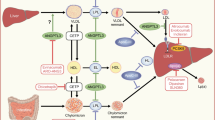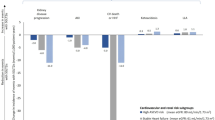Abstract
Compelling evidence has been accumulating that hyperglycemia is independently related with excessive morbidity and mortality in cardiovascular disease (CVD) involving all components of the “gluco-triade”, i.e., HbA1c, fasting plasma glucose, and postprandial or postload plasma glucose. Today's policy for blood glucose-lowering therapy must be “reach and maintain glycemic goals safely and gently.” All available drug options provide a (placebo substracted) HbA1c decrease of around 1%. Due to the often much higher demand for lowering HbA1c, double combinations and even triple therapies are necessary. Avoiding side effects, especially hypoglycemia and too much weight gain, seems to be a priority of today's blood glucose-lowering therapy. The effectiveness of blood glucose-lowering therapy to reduce not only microvascular, but also cardiovascular complications of diabetes, has been demonstrated in the landmark studies DCCT for type 1 diabetes and UKPDS for (newly diagnosed) type 2 diabetes. The most striking long-term “legacy effects” of lowering blood glucose evolved in both studies during the open post-study observation period. The concept of differential therapy on the individual level for blood glucose-lowering therapy, which may be particularly complex in patients with coexisting CVD, will be further emphasized in the future.
Similar content being viewed by others
References
Anselmino M, Ohrvik J, Malmberg K, Standl E, Ryden L (2008) Glucose lowering treatment in patients with coronary artery disease is prognostically important not only in established but also in newly detected diabetes mellitus: a report from the Euro Heart Survey on Diabetes and the Heart. Eur Heart J 29:177–184
BARI 2D Study Group, Frye RL, August P, Brooks MM, Hardison RM, Kelsey SF, MacGregor JM, Orchard TJ, Chaitman BR, Genuth SM, Goldberg SH, Hlatky MA, Jones TL, Molitch ME, Nesto RW, Sako EY, Sobel BE (2009) A randomized trial of therapies for type 2 diabetes and coronary artery disease. N Engl J Med 360:2503–2515
Chiasson J-L, Josse RG, Gomis R, Hanefeld M, Karasik A, Laakso M (2002) Acarbose for prevention of type 2 diabetes mellitus: the STOP-NIDDM randomised trial. Lancet 359:2072–2077
Coutinho M, Gerstein HC, Wang Y, Yusuf S (1999) The relationship between glucose and incident cardiovascular events. A metaregression analysis of published data from 20 studies of 95,783 individuals followed for 12.4 years. Diabetes Care 22:233–240
Dluhy RG, McMahon GT (2008) Intensive glycemic control in the ACCORD and ADVANCE trials. N Engl J Med 358:2630–2633
Duckworth W, Abraira C, Moritz T et al (2009) Glucose control and vascular complications in veterans with type 2 diabetes. N Engl J Med 360:129–139
Gaede P, Lund-Andersen H, Parving HH, Pedersen O (2008) Effect of a multifactorial intervention on mortality in type 2 diabetes. N Engl J Med 358:580–591
Glucose tolerance and mortality: comparison of WHO and American Diabetes Association diagnostic criteria (1999) The DECODE study group. European Diabetes Epidemiology Group. Diabetes Epidemiology: Collaborative analysis of Diagnostic criteria in Europe. Lancet 354:617–621
Holman RR, Paul SK, Bethel MA, Matthews DR, Neil HA (2008) 10-year follow-up of intensive glucose control in type 2 diabetes. N Engl J Med 359:1577–1589
Holman RR, Paul SK, Bethel MA, Neil HA, Matthews DR (2008) Long-term follow-up after tight control of blood pressure in type 2 diabetes. N Engl J Med 359:1565–1576
Home PD, Pocock SJ, Beck-Nielsen H, Curtis PS, Gomis R, Hanefeld M, Jones NP, Komajda M, McMurray JJ; RECORD Study Team (2009) Rosiglitazone evaluated for cardiovascular outcomes in oral agent combination therapy for type 2 diabetes (RECORD): a multicentre, randomised, open-label trial. Lancet 373:2125–2135
Malmberg K, Ryden L, Wedel H et al (2005) Intense metabolic control by means of insulin in patients with diabetes mellitus and acute myocardial infarction (DIGAMI 2): effects on mortality and morbidity. Eur Heart J 26:650–661
Nathan DM, Buse JB, Davidson MB et al (2006) Management of hyperglycaemia in type 2 diabetes: a consensus algorithm for the initiation and adjustment of therapy. A consensus statement from the American Diabetes Association and the European Association for the Study of Diabetes. Diabetologia 49:1711–1721
Nathan DM, Cleary PA, Backlund JY et al (2005) Intensive diabetes treatment and cardiovascular disease in patients with type 1 diabetes. N Engl J Med 353:2643–2653
Otter W, Kleybrink S, Doering W, Standl E, Schnell O (2004) Hospital outcome of acute myocardial infarction in patients with and without diabetes mellitus. Diabet Med 21:183–187
Patel A, MacMahon S, Chalmers J et al (2008) Intensive blood glucose control and vascular outcomes in patients with type 2 diabetes. N Engl J Med 358:2560–2572
Paterson AD, Rutledge BN, Cleary PA, Lachin JM, Crow RS (2007) Effect of intensive diabetes management on macrovascular events and risk factors in the Diabetes Control and Complications Trial (1995) Am J Cardiol 75:894–903
Ray KK, Seshasai SR, Wijesuriya S, Sivakumaran R, Nethercott S, Preiss D, Erqou S, Sattar N (2009) Effect of intensive control of glucose on cardiovascular outcomes and death in patients with diabetes mellitus: a meta-analysis of randomised controlled trials. Lancet 373:1765–1772
Ryden L, Standl E, Bartnik M et al (2007) Guidelines on diabetes, pre-diabetes, and cardiovascular diseases: executive summary. The task force on diabetes and cardiovascular diseases of the European Society of Cardiology (ESC) and of the European Association for the Study of Diabetes (EASD). Eur Heart J 28:88–8136
Standl E, Schnell O (2000) A new look at the heart in diabetes mellitus: from ailing to failing. Diabetologia 43:1455–1469
Stettler C, Allemann S, Juni P et al (2006) Glycemic control and macrovascular disease in types 1 and 2 diabetes mellitus: Meta-analysis of randomized trials. Am Heart J 152:27–38
Wilcox R, Kupfer S, Erdmann E (2008) Effects of pioglitazone on major adverse cardiovascular events in high-risk patients with type 2 diabetes: results from PROspective pioglitAzone Clinical Trial In macro Vascular Events (PROactive 10). Am Heart J 155:712–717
Conflict of interest
The author declares that there is no conflict of interest.
Author information
Authors and Affiliations
Corresponding author
Rights and permissions
About this article
Cite this article
Schnell, O., Standl, E. Diabetes and cardiovascular disease. Clin Res Cardiol Suppl 5 (Suppl 1), 27–34 (2010). https://doi.org/10.1007/s11789-010-0009-8
Published:
Issue Date:
DOI: https://doi.org/10.1007/s11789-010-0009-8




